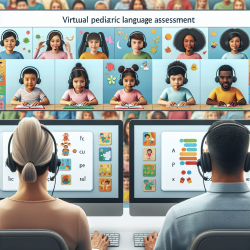Understanding the Impact of Anxiety on Cognition: Insights for Practitioners
As a practitioner in speech-language pathology, understanding the nuances of anxiety and its effects on cognition can significantly enhance your therapeutic interventions. The research article, "The impact of anxiety upon cognition: perspectives from human threat of shock studies," provides a comprehensive overview of how anxiety affects cognitive functions, offering valuable insights that can be applied in therapeutic settings.
The Role of Anxiety in Cognitive Processes
Anxiety is a complex emotional response characterized by physiological, affective, and cognitive changes. It can be both adaptive and maladaptive. Adaptive anxiety enhances the ability to detect and avoid danger, whereas maladaptive anxiety can impair concentration and cognitive performance. The research highlights the use of the "threat of shock" paradigm to study anxiety's impact on cognition, which mimics real-life anxiety without the long-term effects of anxiety disorders.
Key Findings from the Research
- Sensory-Perceptual Processing: Anxiety enhances early sensory processing, making individuals more sensitive to environmental changes. This can be beneficial in threat detection but may lead to over-sensitivity to non-threatening stimuli.
- Working Memory: Anxiety disrupts spatial working memory more than verbal working memory. This is crucial for practitioners working with children, as anxiety can affect their ability to process spatial information, impacting learning and memory tasks.
- Long-Term Memory: Interestingly, anxiety can enhance long-term memory for emotionally arousing information, which might be leveraged in therapeutic settings to reinforce positive learning experiences.
- Executive Function: Anxiety promotes harm-avoidant decision-making, which can be both protective and limiting. Understanding this can help tailor interventions that encourage balanced decision-making in children.
Practical Applications for Practitioners
Practitioners can use these insights to develop targeted interventions that address specific cognitive deficits associated with anxiety. For example, incorporating exercises that enhance spatial working memory or using emotionally positive stimuli to reinforce learning can be beneficial.
Encouraging Further Research
While the "threat of shock" paradigm provides valuable insights, further research is needed to explore the long-term effects of anxiety on cognition and its implications for therapeutic practices. Practitioners are encouraged to stay informed about emerging research to continually refine their approaches.
To read the original research paper, please follow this link: The impact of anxiety upon cognition: perspectives from human threat of shock studies.










